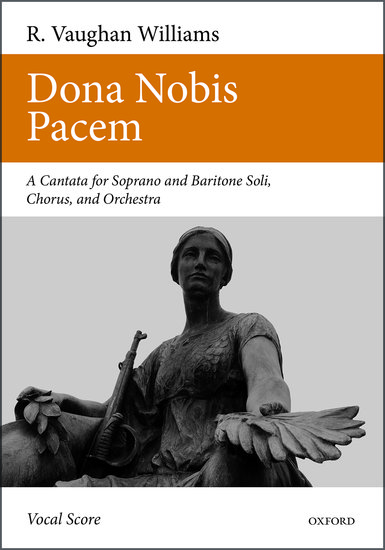The cantata Dona Nobis Pacem by Ralph Vaughan Williams was written at a time when the country was slowly awakening to the possibility of a second European conflict. When invited to provide a work for the centenary of the Huddersfield Choral Society in October 1936, Vaughan Williams remembered that he had in his drawer an unpublished setting of Walt Whitman’s ‘Dirge for Two Veterans’, taken from Whitman’s 1865 collection Drum Taps inspired by the American Civil War which had just ended. Vaughan Williams had written it in 1911 before the First World War, and now resurrected it as the centrepiece of this new work, preceding it with two further poems by Whitman, also from Drum Taps: ‘Beat! Beat! Drums!’ and ‘Reconciliation’. He prefaced this group of Whitman poems with a setting of the words of the Agnus Dei of the Latin Mass, and followed it with a passage from a speech given in Parliament by John Bright in 1855 at the time of the Crimean War. (‘The Angel of Death has been abroad throughout the land; you may almost hear the beating of his wings …’. Vaughan Williams claimed to be the only composer ever to have set a passage from the proceedings of the House of Commons!) In the last two sections he used a series of passages drawn from the Old Testament which together express optimism for future peace. The text is rounded off with the verse from St Luke ‘Glory to God in the Highest and on earth peace, Good will towards men’ and a final repetition of the plea ‘Grant us peace’ in the work’s title.
 Some have criticised the music because the ‘Dirge for two veterans’, of 1911, is stylistically a little apart from the remainder written in the winter of 1935–6. The ‘Dirge’ is as close as Vaughan Williams ever came to writing a Mahlerian funeral march (he was not a Mahler fan), and it certainly commands the attention in a different way to the music before and after. Nonetheless the whole work is welded together by the composer’s sense of urgency; as Simon Heffer, Vaughan Williams’ biographer, has said of Dona Nobis Pacem, his ‘main inspiration is drawn not from the soil of England, but from the whole world going mad around him’. The music for the words from Micah (‘nation shall not lift up a sword against nation, neither shall they learn war any more …’), and thereafter, becomes more optimistic, a foreshadowing of the last movement Passacaglia of the future Fifth Symphony; but, unlike the later work, here the music returns to a state of hesitant prayer sung ppp by the chorus and solo soprano, a prayer that at the time was not to be granted.
Some have criticised the music because the ‘Dirge for two veterans’, of 1911, is stylistically a little apart from the remainder written in the winter of 1935–6. The ‘Dirge’ is as close as Vaughan Williams ever came to writing a Mahlerian funeral march (he was not a Mahler fan), and it certainly commands the attention in a different way to the music before and after. Nonetheless the whole work is welded together by the composer’s sense of urgency; as Simon Heffer, Vaughan Williams’ biographer, has said of Dona Nobis Pacem, his ‘main inspiration is drawn not from the soil of England, but from the whole world going mad around him’. The music for the words from Micah (‘nation shall not lift up a sword against nation, neither shall they learn war any more …’), and thereafter, becomes more optimistic, a foreshadowing of the last movement Passacaglia of the future Fifth Symphony; but, unlike the later work, here the music returns to a state of hesitant prayer sung ppp by the chorus and solo soprano, a prayer that at the time was not to be granted.
Dona Nobis Pacem was performed many times in that anxious period leading up to the Second World War, and given its connections with both World Wars it is again being taken up by choral societies throughout the country as we come to commemorate the outbreak of the First. The work reminds us that war inevitably brings misery and loss. Vaughan Williams knew that as well as anyone yet at the same time he was convinced that, given the circumstances, this war needed to be fought. The composer, like everyone else, was a member of his community and while he was ready to warn his countrymen of the horrors that might lie ahead, he had no hesitation in playing his part in both of the great wars once they had started.
Image credit: Portrait of Ralph Vaughan Williams courtesy of OUP sheet music department. All rights reserved. Do not reproduce without permission.



Recent Comments
There are currently no comments.